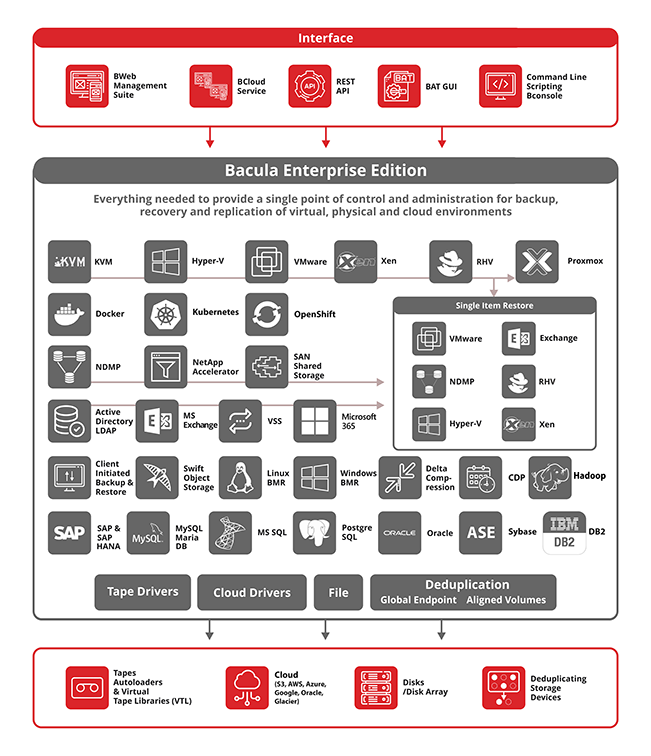Acronis Competitors
The range of backup solution vendors would not be as extensive, nor as competitive, if there was a perfect solution for every organization. As such, Acronis has its own share of disadvantages that may force some of their potential clients to look for Acronis competitors and alternatives.
As an example, the cost of Acronis can be one of its more prominent downsides. While it is true that Acronis is often able to somewhat scale its efforts to match a client company’s growth, a lot of smaller companies may not choose that route purely because a lot of Acronis competitors can be less expensive and still offer a similar feature set.
This not only concerns smaller companies. The fact that Acronis as a service and a platform can be expensive has been well-known for a while now. That is not the only issue with the solution, either. Some users report a sometimes unfriendly user interface, and there are multiple reports about an inconsistent web/mobile experience with the solution as a whole.
Since this particular market is highly competitive, it is not too difficult to find Acronis competitors and alternatives on the market. In addition, all organizations are unique and have, within their own backup and recovery needs, their own individual requirements. However, the overall backup and recovery field is extremely competitive with many solutions that deserve to be highlighted, which is why creating a definitive list of the best solutions for a specific purpose can be a rather problematic task. Luckily, review aggregation websites such as Peerspot and Gartner can help us with this task – which is how this list of top 10 Acronis competitors was created:
- Cohesity DataProtect can be considered a fairly popular solution with a 4.7 out of 5 points rating based on 718 user reviews. It is a multi-cloud data platform that works as a SaaS backup solution, a deployable subscription-based solution, or even delivered via one of the Managed Service Providers. It can offer unprecedented versatility and speed, a user-friendly interface, and a wealth of different data sources it can work with – including databases (mongoDB, SQL Server, Oracle), virtual environments (Hyper-V, VMware, Nutanix, Kubernetes), physical appliances (NAS, tape, disk), different operating systems (Windows, Linux), etc. However, some issues are noted by several reviewers, such as the lack of detailed documentation about the entire solution, several different issues with database backups, and the general lack of support for more diverse platforms that competitors have integrations with.
- Veritas NetBackup has a respectable score of 4.8 out of 5 points based on 413 customer reviews. Veritas is an exceptional data management platform that is deemed one of the best solutions on the market thanks to its flexibility and speed. Veritas puts a lot of emphasis on the fact that their total data coverage amount is now well about 100 exabytes from companies all over the planet. Veritas supports a variety of target backup locations, be it physical, virtual, cloud, or databases, and it also has outstanding speed across the board for both backup and recovery operations, guaranteeing quick RPOs and RTOs. Unfortunately, this array of features is shipped in the form of a sophisticated solution that would be difficult to manage without a previous experience in the field. There is also the fact that Veritas’s offering is split into several different products that cannot be purchased as a complete solution, which may be significantly inconvenient for quite a lot of large enterprises.
- Veeam Backup & Replication may not have the highest score on this list – it is just 4.6 out of 5 right now – but the fact that it is based on a massive number of 1,421 user reviews makes it interesting. While the company itself has quite a lot of different software solutions available, Backup & Replication is used specifically to perform VM-related data protection operations – this includes VMware and Hyper-V environments, multiple database types (Oracle, MS SQL, etc.), as well as several applications such as MS Exchange or MS SharePoint. It is a fast and versatile solution that supports a variety of backup targets while also keeping an impressive speed for both backup and recovery operations. Veeam is also not the cheapest solution on the market, and its regular prices are well above average. There is also the fact that Veeam lacks cloud integration capabilities, and may not be compatible with some of the more traditional storage appliances, such as external hard drives.
- Druva Data Resiliency Cloud has a rather noteworthy rating of 4.8 points out of 5, which was an average result from 595 customer reviews. Druva Data Resiliency Cloud is a solution that offers three distinct fields of experience – data protection, data cybersecurity, as well as data governance. Druva’s backup and recovery operations are fast, its archival capabilities are quite varied, and there are also features such as compliance monitoring, backup air gapping, detailed dashboards, extensive automatization, etc. However, Druva was also reported as not being the most user-friendly solution on the market with some unconventional choices when it comes to user interface, and it also seems to have serious licensing issues if the user in question did not purchase the original license from the MSP but wants to upgrade their current license.
- Commvault Complete Data Protection may not have the best score on the list, but don’t let these 4.5 out of 5 points based on 428 user reviews fool you – it is a comprehensive data protection platform that also offers extensive information management capabilities. Commvault CDP supports different data types, different storage locations, and different use cases, it is well-known for its performance when it comes to detecting and preventing ransomware attacks, as well as other malware types. Other benefits of CDP include automation capabilities, a user-friendly learning curve, and the general versatility of the software. At the same time, it would be fair to mention that Commvault does not have a subscription-based licensing model, it does not support all of the hardware storage solutions (and there may be issues with some of the older ones), and some of its more “premium” features are a lot harder to figure out than the rest of the solution.
- Arcserve Unified Data Protection (UDP) may be the least well-known solution on this list, with a total score of 4.3 out of 5 points with 100 total customer reviews. It’s an all-in-one data protection and cybersecurity offering data backup and data restore operations, disaster recovery procedures, ransomware neutralization methods, and more. It is surprisingly easy to use, has an impressive backup speed, a detailed centralized dashboard, and is relatively easy to deploy. It is also weak in terms of reporting detail, its automation capabilities are basic, and a list of supported backup storage targets does not include some of the rather common ones, such as tape storage.
- Microsoft Azure Backup is a set of backup capabilities from the technological giant itself, with a 4.4 out of 5 points of rating calculated using 115 user reviews. Azure Backup is a relatively unknown solution that has a surprising variety of data protection methods that are mostly revolving around backup and recovery operations. It is relatively cheap, extremely scalable, and even somewhat simple, making it easy to pick up and use even for someone with no prior experience with enterprise backup solutions. It would also be fair to mention that Azure Backup’s customer support is can be somewhat lacking, the number of integrations that the backup solution is capable of is extremely limited, and the overall simplicity of the solution means that some aspects of various backup or recovery processes cannot be customized using this solution.
- Dell Data Protection Suite was not created by the same Dell that sells computer hardware, but its software-related counterpart. It has a rating of 4.7 out of 5 stars based on 767 customer reviews. It is a secure and fast data protection solution that offers a flexible and consistent approach to the task of data protection. The list of features that Dell Data Protection Suite includes, but not exclusive to data deduplication, data compression, scalability, support for a variety of backup storage mediums, and more. Unfortunately, Dell’s solution also has very few protections against different types of malware – including ransomware, and the overall licensing cost of the solution can become uncomfortably high over time.
- NAKIVO Backup & Replication is another notable solution on the market with an average score of 4.8 points out of 5 based on 411 user reviews. NAKIVO is a solution that’s easy to use, and its initial setup is surprisingly easy, it focuses its efforts on providing the best VM backup service on the market – supporting both VMware and Hyper-V and offering a wealth of features and a very high deployment speed. However, NAKIVO’s interface may seem somewhat outdated as a whole, their customer support experience seems to be incredibly inconsistent, and there are some very basic features that the solution is missing such as the Two-Factor Authentication support (2FA).
- Rubrik Security Cloud has a respectable rating of 4.8 out of 5 points with a grand total of 671 customer reviews. Rubrik’s solution combines speed and scalability in a single backup and recovery solution that can perform all kinds of different tasks and scenarios. Its recovery aspects receive praise, and the Live Mount feature is regarded as one of the most unique features of the solution. Unfortunately, Rubrik has a rather problematic track record when it comes to working with open-source database types, its integration capabilities are somewhat limited, and the overall reporting system is not particularly detailed.
Bacula Enterprise is also a good example of an Acronis and Cohesity alternative – offering an especially high level of security and robustness. It also has a number of features that neither of these vendors have, such as Bacula’s own modular approach to technology compatibility and deep integration, with the ability to protect almost any database or hypervisor in the industry. Bacula also has the advantage of having some of the more high-end features for the enterprise, such as advanced deduplication, encoding and compression techniques.It is also known for having an especially broad set of functionality not only with virtual machines and databases, but also container technologies such as Docker, Kubernetes and OpenShift.
Bare Metal Recovery for both Windows and Linux machines is another example of the many technologies that Bacula offers to its clients – equipping them with single platform functionality across physical, virtual, container and hybrid cloud environments. Furthermore, it readily integrates into practically any kind of storage technology.






